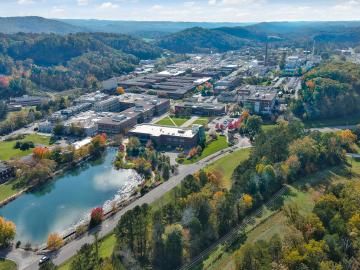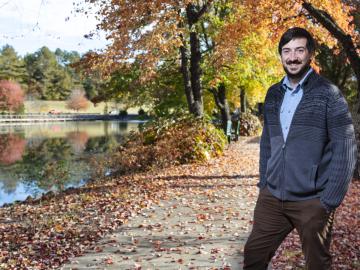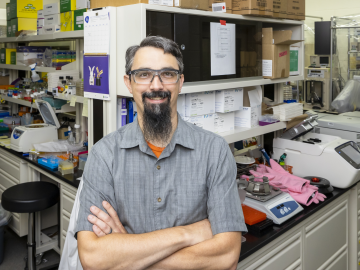
Filter News
Area of Research
- Advanced Manufacturing (1)
- Biology and Environment (77)
- Computational Biology (2)
- Electricity and Smart Grid (1)
- Energy Science (16)
- Functional Materials for Energy (1)
- Fusion and Fission (3)
- Fusion Energy (1)
- Isotope Development and Production (1)
- Isotopes (4)
- Materials (9)
- Materials for Computing (2)
- National Security (6)
- Neutron Science (10)
- Nuclear Science and Technology (5)
- Supercomputing (46)
News Topics
- (-) Biology (128)
- (-) Frontier (64)
- (-) Space Exploration (26)
- 3-D Printing/Advanced Manufacturing (146)
- Advanced Reactors (40)
- Artificial Intelligence (131)
- Big Data (79)
- Bioenergy (112)
- Biomedical (73)
- Biotechnology (39)
- Buildings (74)
- Chemical Sciences (86)
- Clean Water (33)
- Composites (35)
- Computer Science (226)
- Coronavirus (48)
- Critical Materials (29)
- Cybersecurity (35)
- Education (5)
- Element Discovery (1)
- Emergency (4)
- Energy Storage (114)
- Environment (218)
- Exascale Computing (67)
- Fossil Energy (8)
- Fusion (66)
- Grid (74)
- High-Performance Computing (130)
- Hydropower (12)
- Irradiation (3)
- Isotopes (62)
- ITER (9)
- Machine Learning (68)
- Materials (157)
- Materials Science (158)
- Mathematics (12)
- Mercury (12)
- Microelectronics (4)
- Microscopy (56)
- Molten Salt (10)
- Nanotechnology (64)
- National Security (86)
- Neutron Science (171)
- Nuclear Energy (122)
- Partnerships (68)
- Physics (69)
- Polymers (35)
- Quantum Computing (53)
- Quantum Science (92)
- Security (31)
- Simulation (65)
- Software (1)
- Statistics (4)
- Summit (71)
- Transportation (103)
Media Contacts

Several significant science and energy projects led by the ORNL will receive a total of $497 million in funding from the Inflation Reduction Act.

Matthew Craig grew up eagerly exploring the forest patches and knee-high waterfalls just beyond his backyard in central Illinois’ corn belt. Today, that natural curiosity and the expertise he’s cultivated in biogeochemistry and ecology are focused on how carbon cycles in and out of soils, a process that can have tremendous impact on the Earth’s climate.

Scientists working on a solution for plastic waste have developed a two-step chemical and biological process to break down and upcycle mixed plastics into valuable bioproducts.

Tomás Rush began studying the mysteries of fungi in fifth grade and spent his college intern days tromping through forests, swamps and agricultural lands searching for signs of fungal plant pathogens causing disease on host plants.

The Earth System Grid Federation, a multi-agency initiative that gathers and distributes data for top-tier projections of the Earth’s climate, is preparing a series of upgrades.
A team from Oak Ridge National Laboratory, Duke University and other institutions studying Sphagnum moss have identified two new species in North America, and they are learning how evolution may affect the species’ role in carbon storage.

ORNL researchers are deploying their broad expertise in climate data and modeling to create science-based mitigation strategies for cities stressed by climate change as part of two U.S. Department of Energy Urban Integrated Field Laboratory projects.

A new paper published in Nature Communications adds further evidence to the bradykinin storm theory of COVID-19’s viral pathogenesis — a theory that was posited two years ago by a team of researchers at the Department of Energy’s Oak Ridge National Laboratory.

Five technologies invented by scientists at the Department of Energy’s Oak Ridge National Laboratory have been selected for targeted investment through ORNL’s Technology Innovation Program.

Researchers at the Department of Energy’s Oak Ridge National Laboratory and their technologies have received seven 2022 R&D 100 Awards, plus special recognition for a battery-related green technology product.


